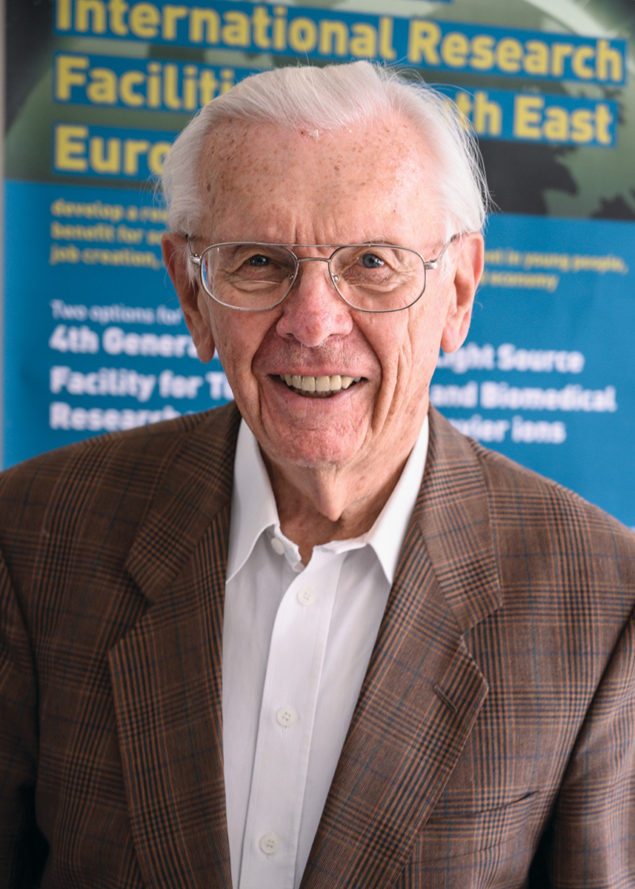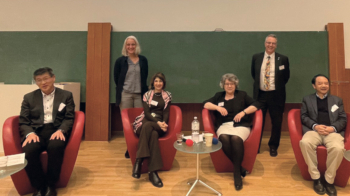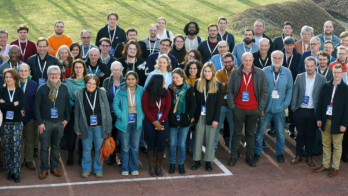Somehow and sometime there will be a solution to the Russian invasion, says Herwig Schopper, and scientists have a special responsibility to build a new world out of the ruins.
 What happened? A tragedy fell upon Ukraine and found many in despair or in a dilemma. After 70 mainly peaceful years for much of Europe, we were surprised by war, because we had forgotten that it takes an effort to maintain peace.
What happened? A tragedy fell upon Ukraine and found many in despair or in a dilemma. After 70 mainly peaceful years for much of Europe, we were surprised by war, because we had forgotten that it takes an effort to maintain peace.
Having witnessed the horrors of war first hand, several years as a soldier and then as a displaced person, I could not imagine that humanity would unleash another war on the continent. As one of its last witnesses, I wonder what advice should be passed on, especially to younger colleagues, about what to do in the short term, and perhaps more importantly, what to do afterwards.
Scientists have a special responsibility. Fortunately, there is no doubt today that science is independent of political doctrines. There is no “German physics” any more. We have established human relationships with our colleagues based on our enthusiasm for our profession, which has led to mutual trust and tolerance.
This has been practised at CERN for 70 years and continued at SESAME, where delegates from Israel, Palestine, Iran, Cyprus, Turkey and other governments sit peacefully around a table. Another offshoot of CERN, the South East European International Institute for Sustainable Technologies (SEEIIST), is in the making in the Balkans. Apart from fostering science, the aim is to transfer ethical achievements from science to politics: science diplomacy, as it has come to be known. In practice, this is done, for example, in the CERN Council where each government sends a representative and an additional scientist who work effectively together on a daily basis.

In the case of imminent political conflicts, “Science for Peace” cannot of course help immediately, but occasionally opportunities arise even for this. In 1985, when disarmament negotiations between Gorbachev and Reagan in Geneva reached an impasse, one of the negotiators asked me to invite the key experts to CERN on neutral territory, and at a confidential dinner the knot was untied. This showed how trust built up in scientific cooperation can impact politics.
Hot crises put us in particularly difficult dilemmas. It is therefore understandable that the CERN Council has to follow, to a large extent, the guidelines of the individual governments and sometimes introduce harsh sanctions. This leads to considerable damage for many excellent projects, which should be mitigated as much as possible. But it seems equally important to prevent or at least alleviate human suffering among scientific colleagues and their families, and in doing so we should allow them tolerance and full freedom of expression. I am sure the CERN management will try to achieve this, as in the past.
Day after
But what I consider most important is to prepare for the situation after the war. Somehow and sometime there will be a solution to the Russian invasion. On that “day after”, it will be necessary to talk to each other again and build a new world out of the ruins. This was facilitated after World War II because, despite the Nazi reign of terror, some far-sighted scientists maintained human relations as well as scientific ones. I remember with pleasure how I was invited to spend a sabbatical year in 1948 in Sweden with Lise Meitner. I was also one of the first German citizens to be invited to a scientific conference in Israel in 1957, where I was received without resentment.
CERN was the first scientific organisation whose mission was not only to conduct excellent science, but also to help improve relations between nations. CERN did this initially in Europe with great success. Later, during the most intense period of the Cold War, it was CERN that signed an agreement with the Russian laboratory in Serpukhov in the 1960s. Together with contacts with JINR in Dubna, this offered one of the few opportunities for scientific West–East cooperation. CERN followed these principles during the occupation of the Czechoslovak Socialist Republic in 1968 and during the Afghanistan crisis in 1979.
The aim is to transfer ethical achievements from science to politics
CERN has become a symbol of what can be achieved when working on a common project without discrimination, for the benefit of science and humanity. In recent decades, when peace has reigned in Europe, this second goal of CERN has somewhat receded into the background. The present crisis reminds us to make greater efforts in this direction again, even more so when many powers disregard ethical principles or formal treaties by pretending that their fundamental interests are violated. Science for Peace tries to help create a minimum of human trust between governments. Without this, we run the risk that future political treaties will be based only on deterrence. That would be a gloomy world.
A vision for the day after requires courage and more Science for Peace than ever before.





